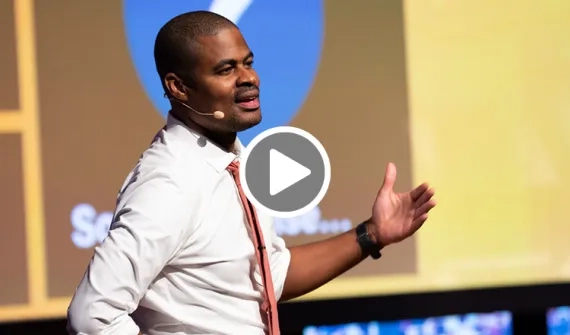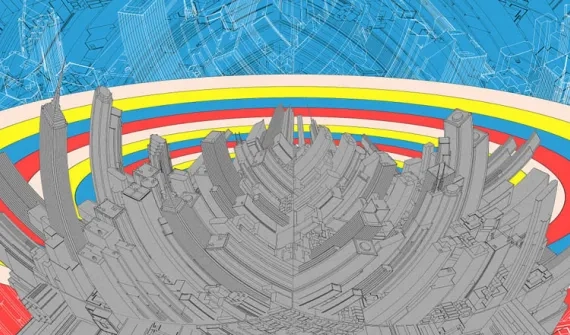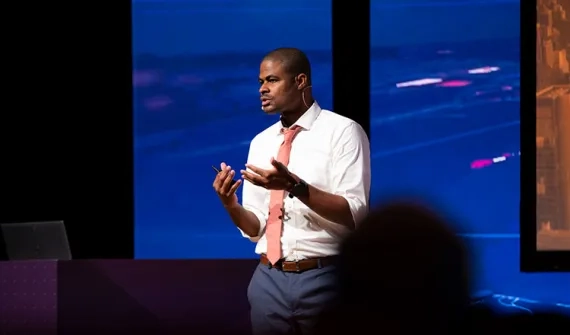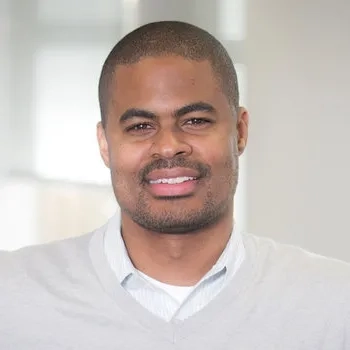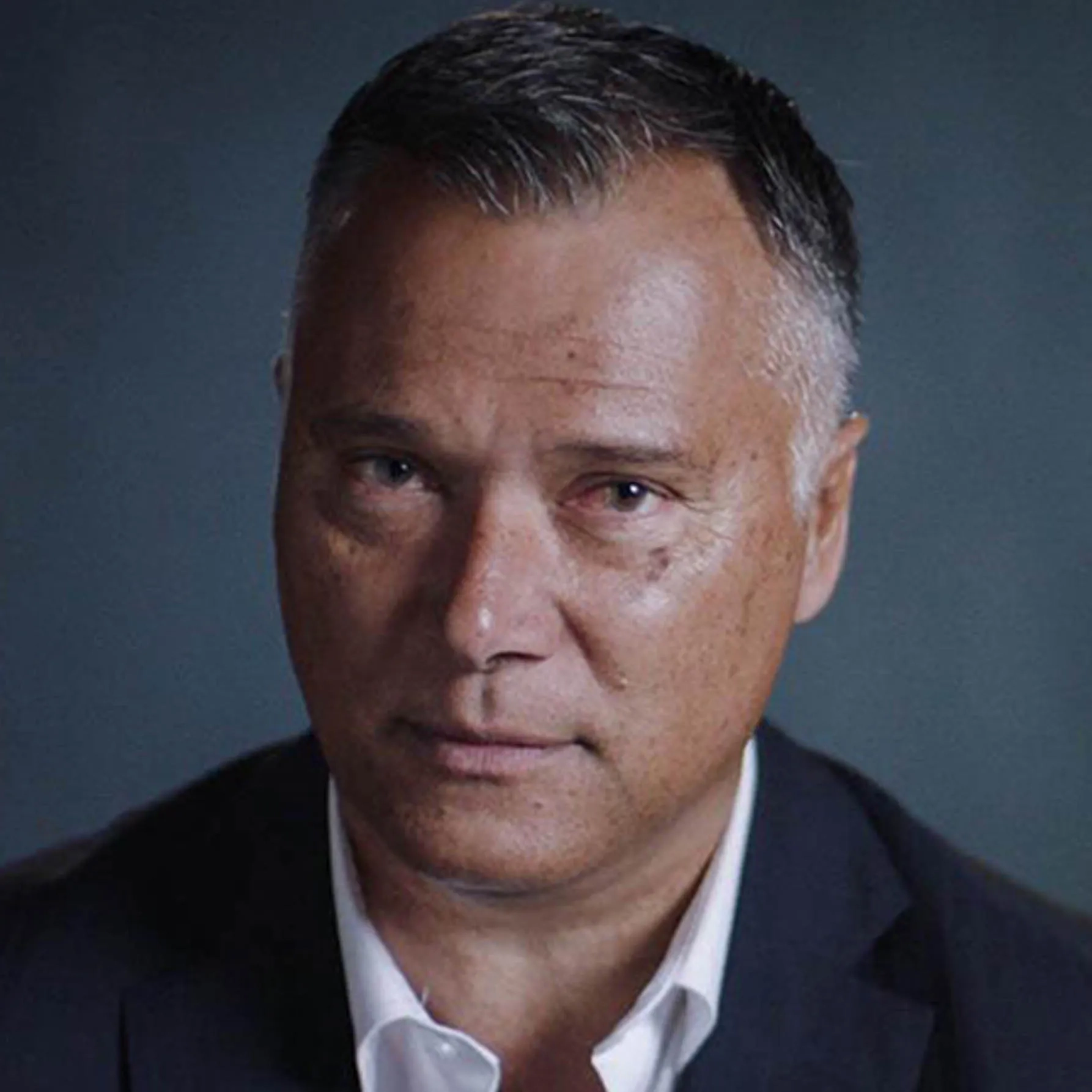Power and ethics: Dr Amen Ra Mashariki on balancing knowledge with utility
Where is the line when it comes to wielding the power of data-driven insight and when should it be crossed? Each time you use your mobile phone, you leave a trail behind. Each app you’ve tapped on, every browser you’ve opened, each link you’ve clicked on, leaves a digital footprint.
That data can be used in so many useful ways – whether it’s planning for hospital beds so there’s no shortage, to urban planning for a world impacted by climate change, or in times of emergency to keep people safe. But the storage of your data also raises important questions about privacy. In the era of meta-tagging and geo-tracking, how can we apply principles to data that are both robust and ethical?
Dr Amen Ra Mashariki is the Global Director for the Data Lab at the World Resources Institute. He has been the Director of the Mayor's Office of Data Analytics in New York City, where he used data insights to create public policy – and shape response to crises including the September 11 terrorist attacks and Hurricane Sandy.
Featured in this episode
Get the latest from BGT Productions
- Click to view the episode transcript
Power and ethics: Dr Amen Ra Mashariki on balancing knowledge with utility
Where is the line when it comes to wielding the power of data-driven insight and when should it be crossed?
Dr Amen Ra Mashariki: Government should not take on all of the burden of driving ethical use of data, but there is a role in terms of regulation and policy that government should have. But then we should also push some of that burden onto the communities or rather the community members in our respective regions, whether it's the UK, whether it's US, whether it's Asia, should stand up and also take its rightful place in this conversation and sort of lead thinking on how to be more ethical.
Stan Grant: Take out your phone, go on, have a look at each app you've tapped today. Each browser you've opened, each link you've clicked on what purchases you made, who you liked or followed and where you went today. Everything we do now leaves a trail and that raises important questions about privacy. In this sea of data, with endless sources of information, meta tagging and geo information all around us. How can we apply principles to this data that are robust, but also ethical?
You're about to meet Dr. Amen Ra Mashariki, the global director of the data lab at the World Resources Institute. He's also been the director of the mayor's office of data analytics in New York, where he used data insights to create public policy and shape responses to crises, including the September 11 terrorist attacks and hurricane Sandy.
So where is the line when it comes to wielding the power of data-driven insight and when should it be crossed? That's coming up on Directions with me, Stan Grant.
Support for this episode comes from the country's leading mapping technology and services provider Esri Australia. To learn more about how Esri tech is supporting the world's progressive leaders, visit esriaustralia.com.au/trailblaze.
Hello, welcome again to Directions podcast I'm Stan Grant. Today, we're discussing something that none of us can avoid and very much frames so much of our lives, and that is data and the collection of data, how that data is analysed. Every day from the moment we get up to the moment we go to bed, we leave a little trail of data behind us, and we know that in a world that is increasingly interconnected, how important that can be in both shaping our response to emergencies, and also just in being able to plan out our own day.
We're speaking to Dr. Amen Ra Mashariki, you've been working for a long time in the area of data analytics, and most notably was chief analytics officer at New York city. And you can only imagine what would be involved in trying to collect data and analyse data in a city of that size.
Uh, Dr. Mashariki, thank you so much for giving us your time. It's a pleasure to be talking to you.
Dr Amen Ra Mashariki: Stan. It's my pleasure. Thank you for inviting me. This is a great topic to talk about.
Stan Grant: Well, it certainly is. Look, it's the topic of our age isn't it. This is an information age, and we're only beginning to see, only beginning to touch the sides of where this might lead us.
Let me take it back for you a step, and what drove your interest in working in data and analysing data.
Dr Amen Ra Mashariki: I think that's a great question. I'll start by saying, you know, my background was in computer science, so, um, I was really in algorithmic optimisation, but in order to do that, well, you needed data. And so really started to move towards the data space.
My career really took off, uh, when I was working on my doctorate and I was working in a surgical simulation space and then moved into the bioinformatics space. And so that's where I really cut my teeth on data was understanding that more data about us as human beings in a biological way would help us to really cure diseases.
Right, and so I really understood the, how the potential of data in saving lives, what that really looked like. And I was at Johns Hopkins as a research scientist for about six to eight years. Then I left to go to the public sector uh, and I joined the Obama administration as a white house fellow, and then later as a chief technology officer of a federal agency.
And then again, I mean you just, you, you can imagine the mounds and mounds of data that exists that's being stored by the federal government. The Obama administration was at the precipice of beginning to understand exactly what all of this data that we've been storing for decades upon decades and the possibilities.
So again, my career came up in the possibilities of data. And as you said, where we are now, we're starting to see some successes, right? Uh, we're starting to see where data can have those very big impacts in cities, in the environmental space, in health, in space. And so, you know, I really just kind of rode that wave to be where I'm at today.
Stan Grant: There's so much to, um, to unpack there, but immediately just in going through how much the government stores, how much information the government has, information about us, but information, you know, gathered from all different walks of life. And I wanted to get to this later, but I think you've opened a window to discuss this now.
And that is the question of the ethics. And I know you've written and spoken about this, but it does raise new philosophical questions, ethical questions about how much of our lives we control. How do we approach an ethical response to the collection and the analysing data?
Dr Amen Ra Mashariki: One is, I think you have to start by acknowledging that the problem that we're facing now, these ethical dilemmas and these challenges, challenges now just didn't start in the age of big data. When you look at what the federal government did, the federal government, the United States with respect to an effort called the Tuskegee experiment, where they were injecting black men and women with syphilis. In order to test them. And they were using that data to understand how to ultimately build out remedies and so on and so forth.
But then this is a big deal. It's been written about ad nauseum, and it was one of those big pieces where you peeled off and you said, Hey, the government has had challenges and has consistently had challenges with respects to ethical use of their power, right? And so one, you have to start there, you have to understand that this is decades upon decades, where this has been happening.
The Tuskegee experiment only ended in the early seventies, which is not so far away, right. When you hear of. Governments injecting people with diseases purposefully, just to test them. You say what had to have happened millennia ago? So one, we have to be diligent and concerned, right? And so no matter who is in the administration, who's leading the administration.
What government it is. It does not matter. Um, as citizens, we should always start from a space of concern because we understand that this has been happening. And so we need to be more deliberate about challenging it. Two is I think government has to understand its role in managing this government should not take on all of the burden of driving ethical use of data, but there is a role in terms of regulation and policy that government should have, but then we should also push some of that burden onto the communities or rather the community members in our respective regions, whether it's the UK, whether it's US, whether it's Asia, should stand up and also take its rightful place in this conversation and own some of, sort of lead thinking on how to be more ethical, right. And so government and community and the people whose data it is should partner well on this.
Stan Grant: You've just raised so much there. I mean, even that experiment alone, not widely known, it raises questions about communities and targeting communities and communities that may be more vulnerable or communities that don't have the same power don't have sovereignty, in fact, we're talking about really sovereignty over your own lives aren't we?
Dr Amen Ra Mashariki: Absolutely. And there's two sides to that coin, right? So there is the idea that your data, your sense of privacy doesn't belong to you. Someone else owns that, right? There's that part that there's data being generated about you that's being used and not necessarily on your behalf, and you have no idea how and where it's being used.
And then there's the other side, which is, you as a community member. Being able to have access to data. And that's where this concept of open data comes into play. So there's the side that says, Hey, we need to be very careful about the data that we're aggregating that we're storing and that we're making available.
Then there's the other side, which is the open data movement that says actually, You know, transparency is one way to move against, uh, unethical use of data, unethical use of anything. Whether it's unethical use of force on ethical use of resources, transparency, opening that data up, making it available to people within communities, making it available to, uh, leaders and policy makers, such that we understand what actually is going on under the hood.
Stan Grant: How do you approach that as someone who is a practitioner and someone who's been being the position of leadership as well. And knowing that this can be very treacherous terrain that you're sort of entering into here. How do you approach these ethical questions?
Dr Amen Ra Mashariki: The exact answer is carefully, right? One way I would say is that there's a book that I like that I've read many times over it's called "To engineer is human".
It talks about these big structures that we've built as human beings over time. And all of the calamities that have happened during the building of those structures, right? The deaths when we built bridges back in the day and so on and so forth, you can imagine with the lack of technology, how many lives perished, trying to build some of these gargantuan structures.
And it said, but if we were afraid of all of the bad things that can happen, imagine what society would look like in terms of our infrastructure, in terms of the structures that we would have ultimately went ahead and built. So I think there are always, and I'm going to be very careful how I say this, I think there are always going to be challenges.
There's always going to be concerns, impediments or roadblocks. And the way I think about it is we have to be facing towards the direction of progress, which is more data, to be more useful. We have to be facing towards the direction of precision, which is not having to pull in everybody's data to figure out an answer to a question.
We have to be more precise such that we don't have to use a lot of data. So we should be moving in the direction of progress, but understand that this will not succeed without a bumping up against some ethical challenges. Some technical challenges, some humanistic challenges. There's going to be those roadblocks. There's going to be those impediments. There are going to be people who are going to push back.
Stan Grant: Your work in New York city, of course is fascinating. And you are dealing with a big population and a diverse population in so many ways, you know, geographically, ethnically, racially along sort of economic, socioeconomic lines as well. When you came to that job, there were some big things you had to look at.
Um, there was the hangover from the nine 11 terrorist attacks.
Dr Amen Ra Mashariki: Right.
Stan Grant: And looking at where some of the mistakes may have been made or faults in the system or things you could do better. And then of course you had to deal with what was, can be seen now in retrospect is perhaps even a trial run for COVID and that was an outbreak of Legionnaires' disease.
Let me go to the first thing with nine 11. When you come in there, it's been some years since then, since that attack, but where did you go to work in that? Because that raised a lot of questions around data and the collection of data. And of course, the response to terrorism, more broadly as raised ethical issues around the collection of data, access to people's private information.
So how did you approach looking at that? Where were some of the areas that you thought needed to change needed to fix given of course the devastating impact that those attacks had on the city.
Dr Amen Ra Mashariki: Let me actually rephrase the question if you don't mind. I think it's a, well put question. Let me add something to it rather. Actually, when I came in, in 2014, hurricane Sandy and the aftermath of hurricane Sandy was on everyone's mind and our response to hurricane Sandy and more, more specific our data focused response to hurricane Sandy. So this was one of the first times we had a trial run of how do we share data?
There were big conversations around the office of emergency management, getting calls about down power lines and down trees and cars in the middle of the road and all sorts of other emergencies. And how do we bring all of this data together, uh, integrate it, uh, geo locate that data and then begin to effectively send what is essentially paired down force.
Like you said, there's so many people and there's so much space in New York city there's not enough city employees that you can send out. Uh, you can't send them all out at the same time. So you have to prioritise. We did uh, okay. Uh, halfway decent, and I'm being generous here, job there. Uh, the Bloomberg administration essentially wrote an after action report and said, uh, the next person that comes in here that leads up data has to do A, B, C, D E F G, and has to do it 10 times better.
And so we sort of had a playbook because the idea was that it wasn't, it wasn't so much as a playbook that was handed off to us. It was an independent after action report that mentioned what this mayor's office of data and analytics would need to do and need to stand up in case of the next emergency.
So, one, I technically, I wouldn't call it a playbook in that it was easy to follow, but using that after action report, I knew where to lead. Now I'll tie this into nine 11, because remember nine 11 was about not, not being able to do when you, when you read the nine 11 commission that report, it talked about us not being able to connect the dots from federal to state, to local.
Stan Grant: And to work collaboratively, because you've spoken about collaborative data, you know, how you work collaboratively. And that was a big failing wasn't it.
Dr Amen Ra Mashariki: If you want to identify progress in nine 11, it just didn't exist. It just did not exist, right. During Sandy, you had a more collaborative effort, but no one understood what to do with the data. Everyone, you still, you had a collaborative effort on non-data things, but when it came to data, no one knew how to talk to each other.
No one knew how to make their data connect or be interoperable. I'll just add one more thing again to the nine 11 notes. So after nine 11, the federal government department of Homeland security created this standard called NIEM National Information Exchange Model. It was a technical protocol a data protocol, that said, if everyone adheres to this data protocol, then you should be able to share and integrate your data fairly easily.
So we, we began to bring New York city, remember I was in the federal government before I came to New York city, so I brought that standard to New York city, but that's then was a direct result of the nine 11 commission that said, Hey, we just don't, we didn't know how to share data and collaborate. So we used that as our backbone such that when Legionnaires happened, we had that capability and we brought it to bear.
Stan Grant: That's fascinating because that is such an iterative process and unfortunately, you're having to respond to crises, you're learning on the job. You are looking at new ways of doing things in real time with real time consequences. And it raises another issue that I want to come to our hypothetical in a moment where I think we'll probably draw on all of that experience and apply it to that. But the final piece I'd like to talk about before we get to the hypothetical is leadership itself.
And to the extent that you, as a relatively young man and, you know, I'm, I'm pushing up against 16 hours. So if I keep talking to people who are incredibly accomplished and much younger than me, which is starting to give me a bit of a complex, but, um, but as someone of, you know, relatively young who has, has been in positions of real leadership and authority, it raises questions there about how you approach leadership.
Is there a generational shift here? You've mentioned collaboration, um, you've mentioned ethical questions that perhaps weren't being asked earlier. So as a leader, how do you approach something like this?
Dr Amen Ra Mashariki: You know, one of my core leadership, uh, concepts that I follow at all times is, one, you surround yourself with people that are smarter than you. Uh, because when you bring people who are smarter than you about these things, about data, uh, about the city. You bring them to the table. My job is as a leader is not to do everyone's job better than them. My job is to just move things out of the way so they can do their jobs the way that they want to do their jobs. So that's more tactical. I think more theoretical, the way that I think about leadership is that, especially from my time in New York city, is that, uh, there are known knowns, known unknowns and unknown, unknowns.
Stan Grant: Yes.
Dr Amen Ra Mashariki: And I bring that up to say that the known knowns and the known unknowns, there are people who have been working on those, who have been wrapping their heads around those, that work in New York city. They've been doing that for decades. Understanding the knowns. We know that these are the challenges.
Stan Grant: Yeah.
Dr Amen Ra Mashariki: We know how to respond to those. The known unknowns. Well, we know we can, this is where we might see some variants in some, some concerns and so on and so forth, but we also have these mechanisms to respond to. As a leader, your job is to be out in front and be prepared and be as ready as you can for the unknown unknowns.
You need to be the first person out in front when that thing, that you didn't know what's going to happen, happens. Everyone is going to pause. They're going to have this terrified look on their face, and they're going to look to you. If you have that same terrified look on your face, it's done. Right? And so as a leader, your job is really to be prepared to move uh, on the unknown unknowns.
Stan Grant: I want to just take a quick minute to let you know if you'd like to learn more about some of the incredible projects Aman has worked on with groups like the world resources Institute and the city of New York, get along to our website at directionspodcast.com.au, take a look at the video on data drills, which is like a fire drill, but for your data, absolutely fascinating stuff.
There's also a link to a free trial of the Esri software Amen and uses up there too.
Well, Amen you have opened perfectly the segue to get into our hypothetical, I don't know what your face looked like when you saw the reality of COVID-19, but you know, most of us were just, and talking about unknown unknowns, we knew that there was a potential for a virus like this we'd had trial runs, there was SARS. So I wanted to go through the hypothetical now.
COVID-19 hits New York city early and hit hard. We know that. The city experienced an alarming rate of death from the pandemic, we saw the impact it had on the economy. So COVID-19 is now under control and vaccines have been distributed, but we know that these dark days are far from over. There is second and there are third waves and they mutate. And then there, of course, the, the ongoing hardships as a result of, of having to battle COVID. Shootings are on the rise.
Some new Yorkers we know are getting out of the city area and they going to the suburbs. The city is now looking to rebuild the economy. Now you've received a call from the mayor, your previous employer tasking you now with assessing this situation and providing recommendations for a path forward. So where do you go for an immediate response to this?
Dr Amen Ra Mashariki: That's uh, a fairly non-trivial question to a very intense setup. One, you start with the experts on the ground. There's one thing that you have to understand about these data teams. These data teams are not the experts on the ground. They are value add, right? They are a capability to add on top of to 10 X, the capability of the actual true experts on the ground.
So one is, if this doesn't exist already, you build a consortium of data leaders across the agencies. So the expectation there is that these agency data leaders have been gathering and managing and cleaning and in to some extent also identifying insights that are relevant to their mission. Their specific mission about the city and about the first wave of COVID.
So one is you bring those folks to the table and say, what do we know, let's benchmark? And let's put a reference point on what we know about the past X months and how the city responded and what impact it has had on the city. So you have to always start with a baseline of information and so you go to the experts on the ground, the agency officials, the agency field operators, and so on and so forth.
So you bring them to the table. But you don't stop there. A lot of external entities, uh, always play a role in responding to these catastrophes. So whether they're NGOs, non-profits, they are on the ground and they stay on the ground, year round, all the time. And so they bring a wealth of information and also, which has been neglected, it has been neglected during the COVID recovery. They bring a wealth of data. You bring them to the table. You bring academic institutions to the table. Academic institutions should have already been thinking about some things. They bring a lot of fire power in terms of intellectual uh, stamina for the conversation. So you bring them to the table.
Lastly, and this has been the most disappointing part of what I have seen, because this does not happen. You bring the community members to the table. The community members who are the ones who have been experiencing this, but you need to bring those people to the table while they can tell their stories, uh, and live.
Stan Grant: You've really anticipated where, just where I was going to go. I can see that you've been down this road before. The media has gone out to those people who are most effected, who has been most effected, usually the poorest communities and often black communities. So in the middle of Coronavirus, we've also had a situation of Black Lives Matter protests across the country. These communities, given what you've already outlined are already really reluctant to participate in any data collection exercise. They don't trust you because of past history and present experience. How do you get trust with the community?
Dr Amen Ra Mashariki: If you're asking me the scenario is during the emergency and we have not built bridges into those communities prior to the emergency, as a leader you would have to stand up and say, okay, these are the things that we need to do. We need to identify where are we going to do this correct. We need to identify the question marks in what we're doing, the things that we will have to answer to after the fact.
Uh, and make sure we have our ducks in a row with regards to answering to that. And then move forward. And then after people say, well, the work that you did was great and it was extremely helpful, but some people say that there were policies in place you used certain health data that you maybe should not have used.
Then you have to walk through, here's every risk that we knew we were taking. And here's how we mitigated those risks, right. And then. You have to have that, but you have to have that conversation with the community during and after if you have not had that conversation with the community beforehand.
Stan Grant: And given, keep keeping in mind, of course, that we are now in a phase where perhaps the worst is over, but there's also the fear that it could come back.
It is a rebuilding phase and you're looking ahead here. We already have a lot of data on hand. We know where the worst hit areas of New York city, were we know which communities endured the worst of COVID. And we know where the communities have been hardest hit economically. How do you use mapping as well?
You know, the collection of geographic data, spatial technology, to be able to, to focus on the areas of greatest need and where you can start to rebuild and where you need to prioritise.
Dr Amen Ra Mashariki: I love this conversation, uh, around, uh, location intelligence, and I love that term.
Stan Grant: Hmm.
Dr Amen Ra Mashariki: Location intelligence, because it's not just about where, but it's around the context of where. The question you have to now answer, and this is the intelligence part of location, now that you know, where there's other pieces of data that bring to context that where, to explain to you, well, why did it happen in these areas? And so once you begin to answer the question of, so we know it happened in these neighbourhoods we saw outbreaks of COVID that were greater in these neighbourhoods, then that's the location part.
Then you bring in the intelligence part and then you say, now we understand better, we did an analysis and we understand better why that happened. One, you can mitigate any more communities from suffering from that same fate.
Stan Grant: You're communicating, you're explaining it to people too, and you're using the data to better explain that.
Dr Amen Ra Mashariki: 100%, 100% Stan, I think that the seats should be reversed. You you're answering the...
Stan Grant: No believe me you don't want me making the decisions.
Dr Amen Ra Mashariki: You've given me the answers.
Stan Grant: I'll ask the questions.
Dr Amen Ra Mashariki: Location intelligence absolutely is you, can be used as a communication tool as well.
Stan Grant: We're almost out of time, but I wanted to finish just with a couple of observations from you about leadership and what we've even gleaned from this conversation.
Where we are failing in terms of using data more effectively and providing leadership around that, you've touched on those ethical questions, better communication, prioritising using information as a communicative tool and being able to map where areas are most effected or where you can apply the best, the best measures to achieve the best outcomes.
But one of the things that strikes me Amen throughout all of this conversation is that you're always playing catch up aren't you. I mean whether it's nine 11 and learning the lessons, whether it's Sandy and learning the lessons, whether it's, it's Legionnaires and learning the lessons and then COVID and learning the lessons.
How do you as a leader get in front rather than having to play catch up?
Dr Amen Ra Mashariki: That's a good question I'll see if I can answer that briefly, you know, it makes me think about industries like the health industry. Only until we've seen a disease many, many, many, many, many times do we build infrastructure and a capability to respond to that disease?
I think there's a few, like the common cold that we haven't figured out remedies for, right. And it's like, you know, they always say uh, you go to a hospital, hospital is good at responding to illness. If you go to a hospital and say, Hey, I am totally fine, tip top health shape, but I want to know how you guys can help me.
There's very little that can be done, maybe you can go to a dietician. Maybe you can suggest, you know, Hey add some more broccoli, you know, you can always add broccoli to your diet, right. My parents say, say as much. Right. Um, but I think the question is challenging in that, do we have enough data? Do we know enough yet to be out in front of these things?
Or really are we resigned. And I'm answering your question with a question, because I think about this all the time. Are we resigned to sort of being always, the analogy I use is the emergency room. Um, the best emergency rooms are the ones that say, I don't know, what's coming through that door in the next minute or so, but I tell you what, we've got every technology, we've got the best doctors, we've got the best infrastructure, we've got the best nurses. We've got everything in place to respond to anything that comes in that door, right. And that's the position I think cities should be in.
Stan Grant: And just a final thought from you on leadership, what's the greatest lesson you have learned, or the person you have looked to, the mentor or the experience that you had, which has shaped you as a leader.
Dr Amen Ra Mashariki: I would actually say my Mum, she was one who taught me how to program she worked at IBM for a long time and she taught me how to program, but so I looked towards her, um, for a lot of, uh, uh, intellectual guidance. But I've seen her, uh, move gracefully and elegantly in some very tough situations throughout my life from a young person, even literally to now as an adult.
So I think a strong leader, not only has the remit to respond swiftly and strong to things that happen, but you also have to do it gracefully and respectfully and recognise the power of, you know, your job and your role. So, and I've seen my Mum do that throughout her life, and I hope to sort of emulate that type of, uh, that type of leadership.
Stan Grant: That's a great answer. And she would tell you to weight your broccoli as well. It's , it's been, it's been a real pleasure, Dr. Mashariki you're a real pleasure to talk to you. Thank you so much for giving us your time on this, uh, on this directions podcast. Thank you again.
Dr Amen Ra Mashariki: It's been my pleasure. Thank you so much, Stan. I really appreciate it. It's been an honour.
Stan Grant: That's Amen Ra Mashariki, the global director of the data lab at the world resources Institute and a former chief analytics officer. for New York city. On the next episode of directions: as a specialist geologist, Dr. Katherine Sullivan, was recruited by NASA to become the first American woman to walk in space in 1984. She was also the first woman to dive to one of the earth's deepest ocean floors. Dr. Sullivan's a scientific and institutional leader named by the BBC as one of the most influential women of 2020.
Dr Kathryn Sullivan: The space age is the first time in human history that you really can say, we can take a snapshot of the entire planet, the distribution of moisture in the entire global atmosphere, essentially now. Temperature on ocean surface everywhere on the planet, essentially now. That's thanks to satellites. And that ability to get that essentially instantaneous snapshot, this is the state of the planet right now, those are the data that let you run computer models that allow you to forecast or predict ahead.
Stan Grant: Dr. Kathryn Sullivan coming up on the next episode of Directions.
This is a Boustead Geospatial Technologies Production. This episode was narrated by me, Stan Grant and Dr. Amen Ra Mashariki. Sound engineered by Nearly Media and Deadset Studios with editing support from Kim Douglas and Sydney Podcast Studios. Artwork by Superscript, and our Executive Producers are Alicia Kouparitsas and Raquel Jackson.
If you like our show, please give us a five-star rating, leave a review and be sure to tell your friends. Follow us on Apple podcasts or wherever you get your podcasts. You can also download a free trial of Esri software, check out our show notes and access other resources at directionspodcast.com.au.
The views and opinions expressed in this podcast are solely those of the participants, and do not necessarily represent the views or opinions of Esri Australia, its subsidiaries or partners. Hypothetical scenarios presented as part of this episode are purely fictional and while they may draw on current issues, they do not depict the actions, values or beliefs of any specific individual and or organisation.
And finally this production would not be possible without the support of Esri Australia.





 VIEW TRANSCRIPT
VIEW TRANSCRIPT